Corporate Law: Phoenix Activity, Case Study and Legal Analysis
VerifiedAdded on 2020/03/04
|12
|3621
|66
Report
AI Summary
This report provides an in-depth analysis of Phoenix activities within the context of Australian corporate law. It explores the concept of Phoenix activity, where a new company is formed using the assets of an older company, often with the intention of avoiding tax liabilities and debts. The report examines both legal and illegal aspects, differentiating between legal business rescue scenarios and illicit activities aimed at defrauding creditors. It discusses the roles of key institutions like the Australian Securities and Investments Commission (ASIC) and the Australian Tax Office (ATO) in regulating these activities. The report further analyzes the legal framework, including relevant sections of the Corporations Act 2001 and the Taxation Administration Act 1953, and provides insights from the case of Giudice v Bolwell [2012] VSC 280. The potential benefits of legal Phoenix activities, such as encouraging entrepreneurship and protecting employee interests, are also explored. The report concludes by highlighting the negative impacts of illegal Phoenix activities, including tax evasion, damage to creditors, and the need for regulatory measures to protect stakeholders.
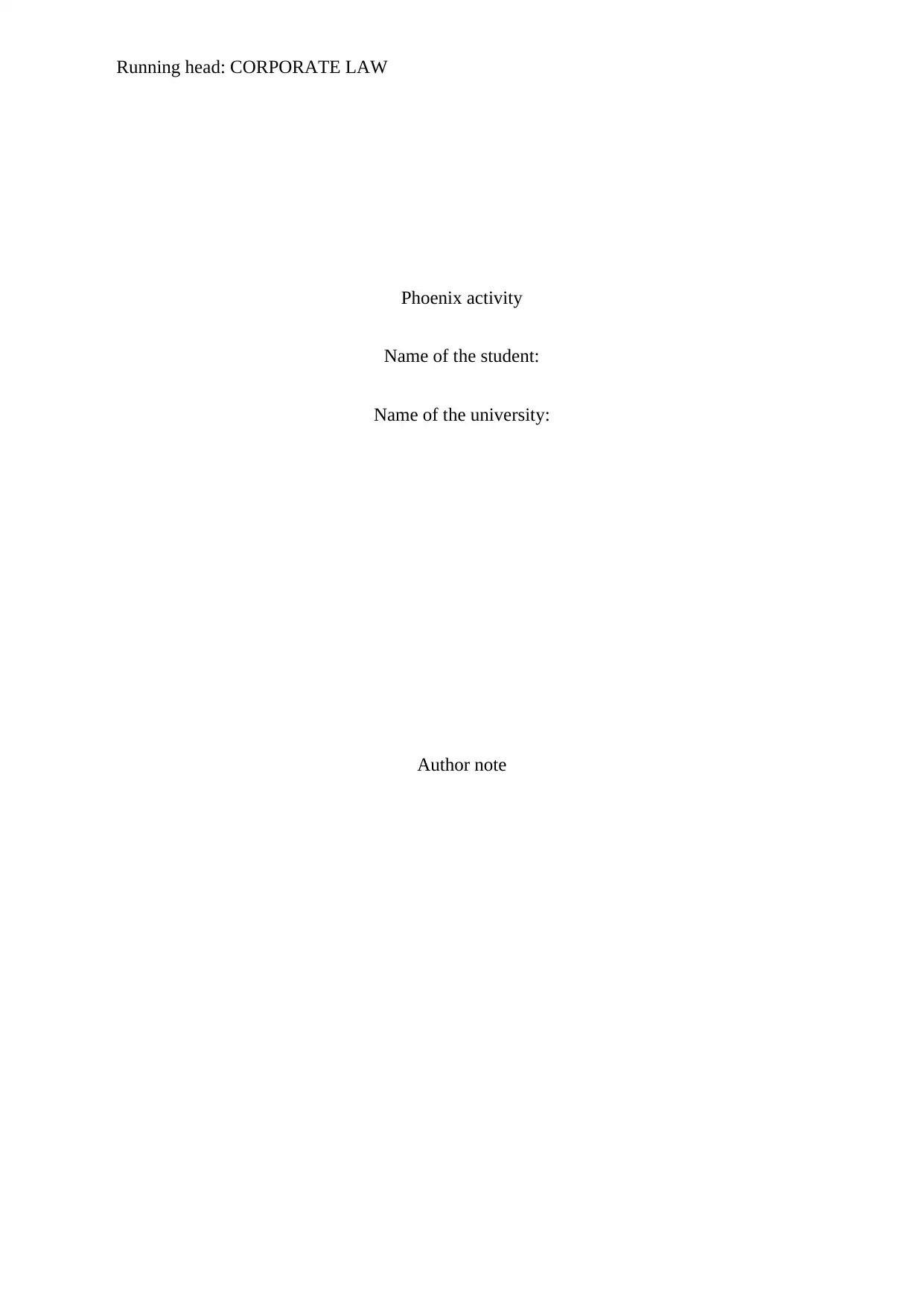
Running head: CORPORATE LAW
Phoenix activity
Name of the student:
Name of the university:
Author note
Phoenix activity
Name of the student:
Name of the university:
Author note
Paraphrase This Document
Need a fresh take? Get an instant paraphrase of this document with our AI Paraphraser
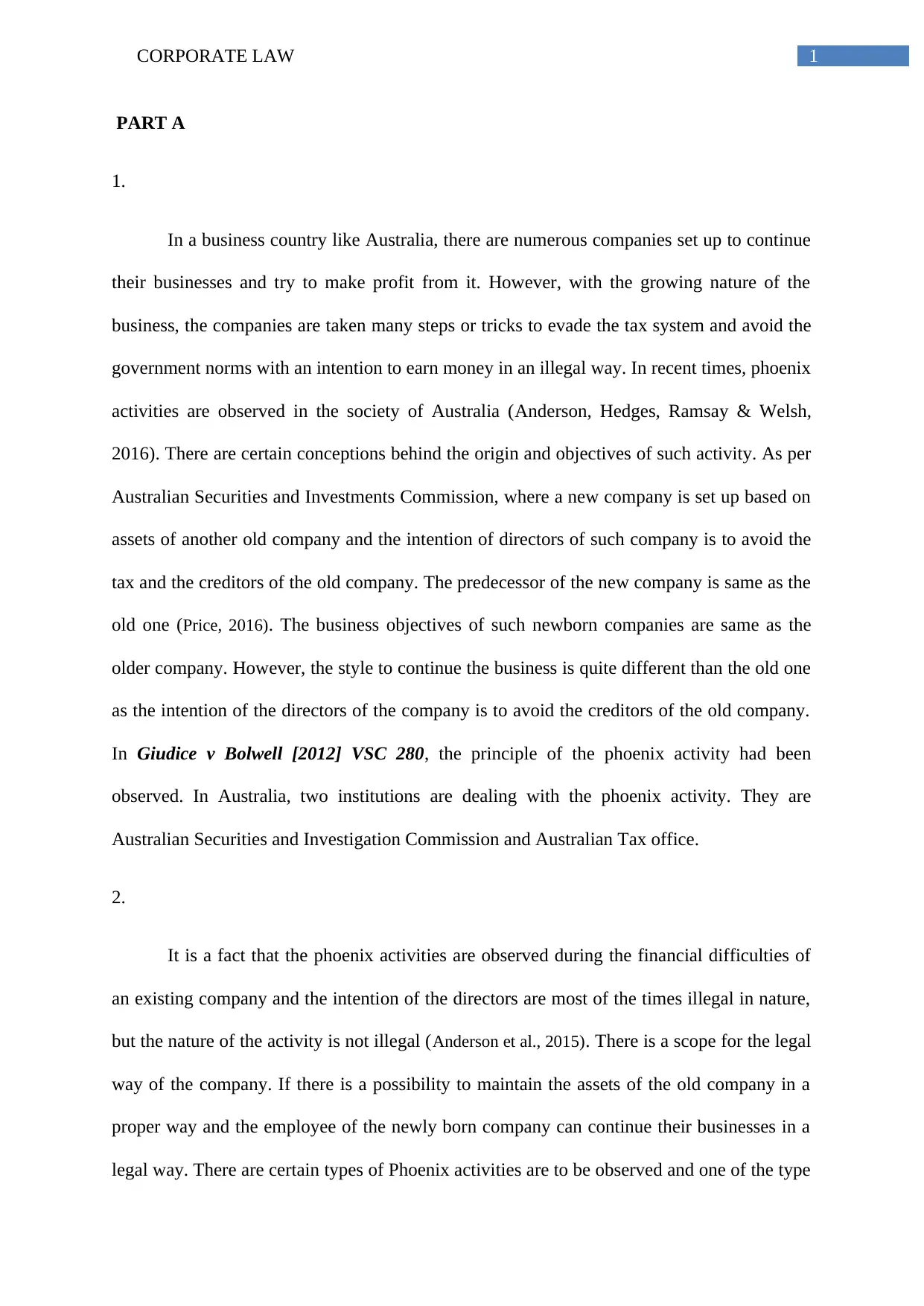
1CORPORATE LAW
PART A
1.
In a business country like Australia, there are numerous companies set up to continue
their businesses and try to make profit from it. However, with the growing nature of the
business, the companies are taken many steps or tricks to evade the tax system and avoid the
government norms with an intention to earn money in an illegal way. In recent times, phoenix
activities are observed in the society of Australia (Anderson, Hedges, Ramsay & Welsh,
2016). There are certain conceptions behind the origin and objectives of such activity. As per
Australian Securities and Investments Commission, where a new company is set up based on
assets of another old company and the intention of directors of such company is to avoid the
tax and the creditors of the old company. The predecessor of the new company is same as the
old one (Price, 2016). The business objectives of such newborn companies are same as the
older company. However, the style to continue the business is quite different than the old one
as the intention of the directors of the company is to avoid the creditors of the old company.
In Giudice v Bolwell [2012] VSC 280, the principle of the phoenix activity had been
observed. In Australia, two institutions are dealing with the phoenix activity. They are
Australian Securities and Investigation Commission and Australian Tax office.
2.
It is a fact that the phoenix activities are observed during the financial difficulties of
an existing company and the intention of the directors are most of the times illegal in nature,
but the nature of the activity is not illegal (Anderson et al., 2015). There is a scope for the legal
way of the company. If there is a possibility to maintain the assets of the old company in a
proper way and the employee of the newly born company can continue their businesses in a
legal way. There are certain types of Phoenix activities are to be observed and one of the type
PART A
1.
In a business country like Australia, there are numerous companies set up to continue
their businesses and try to make profit from it. However, with the growing nature of the
business, the companies are taken many steps or tricks to evade the tax system and avoid the
government norms with an intention to earn money in an illegal way. In recent times, phoenix
activities are observed in the society of Australia (Anderson, Hedges, Ramsay & Welsh,
2016). There are certain conceptions behind the origin and objectives of such activity. As per
Australian Securities and Investments Commission, where a new company is set up based on
assets of another old company and the intention of directors of such company is to avoid the
tax and the creditors of the old company. The predecessor of the new company is same as the
old one (Price, 2016). The business objectives of such newborn companies are same as the
older company. However, the style to continue the business is quite different than the old one
as the intention of the directors of the company is to avoid the creditors of the old company.
In Giudice v Bolwell [2012] VSC 280, the principle of the phoenix activity had been
observed. In Australia, two institutions are dealing with the phoenix activity. They are
Australian Securities and Investigation Commission and Australian Tax office.
2.
It is a fact that the phoenix activities are observed during the financial difficulties of
an existing company and the intention of the directors are most of the times illegal in nature,
but the nature of the activity is not illegal (Anderson et al., 2015). There is a scope for the legal
way of the company. If there is a possibility to maintain the assets of the old company in a
proper way and the employee of the newly born company can continue their businesses in a
legal way. There are certain types of Phoenix activities are to be observed and one of the type
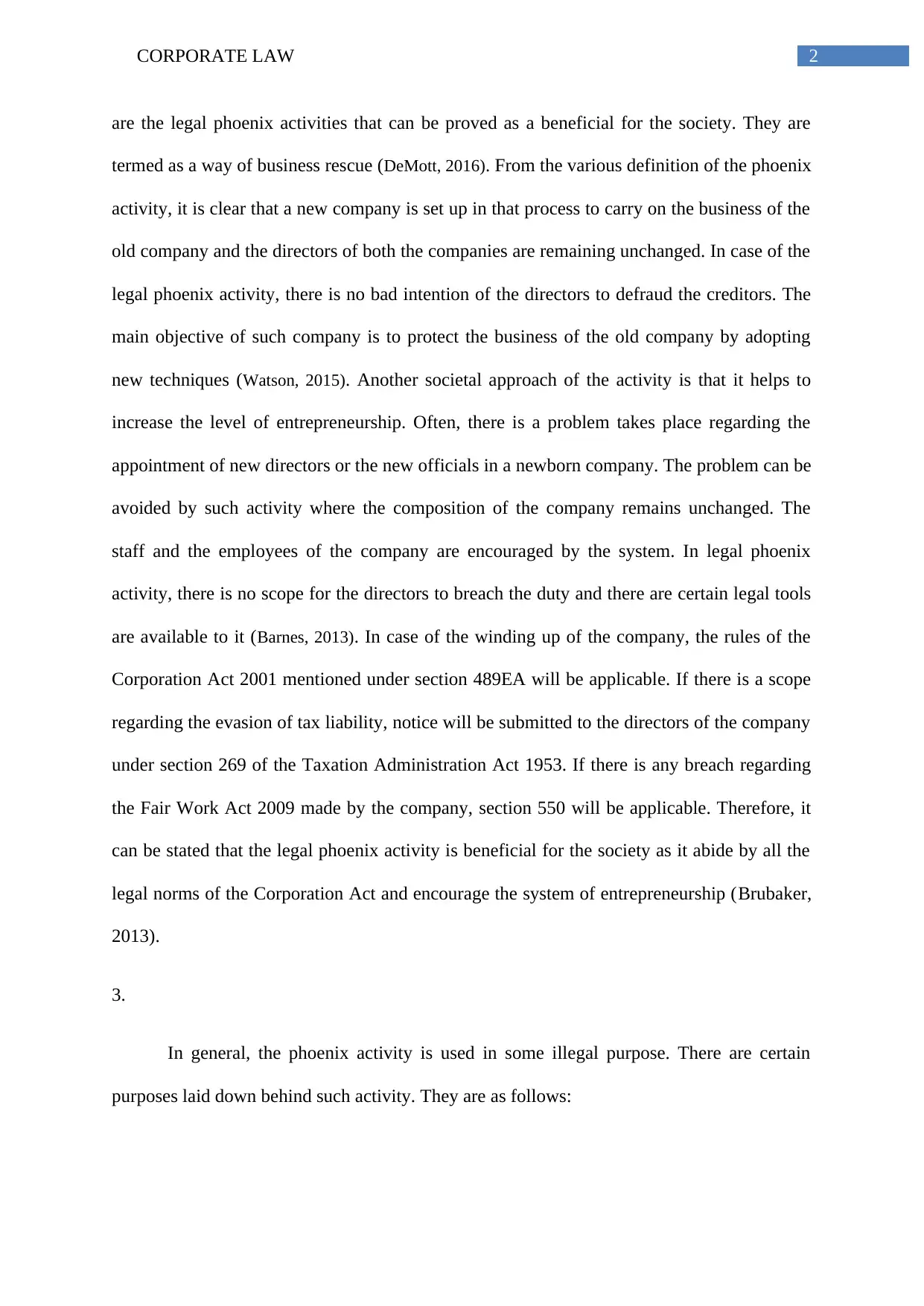
2CORPORATE LAW
are the legal phoenix activities that can be proved as a beneficial for the society. They are
termed as a way of business rescue (DeMott, 2016). From the various definition of the phoenix
activity, it is clear that a new company is set up in that process to carry on the business of the
old company and the directors of both the companies are remaining unchanged. In case of the
legal phoenix activity, there is no bad intention of the directors to defraud the creditors. The
main objective of such company is to protect the business of the old company by adopting
new techniques (Watson, 2015). Another societal approach of the activity is that it helps to
increase the level of entrepreneurship. Often, there is a problem takes place regarding the
appointment of new directors or the new officials in a newborn company. The problem can be
avoided by such activity where the composition of the company remains unchanged. The
staff and the employees of the company are encouraged by the system. In legal phoenix
activity, there is no scope for the directors to breach the duty and there are certain legal tools
are available to it (Barnes, 2013). In case of the winding up of the company, the rules of the
Corporation Act 2001 mentioned under section 489EA will be applicable. If there is a scope
regarding the evasion of tax liability, notice will be submitted to the directors of the company
under section 269 of the Taxation Administration Act 1953. If there is any breach regarding
the Fair Work Act 2009 made by the company, section 550 will be applicable. Therefore, it
can be stated that the legal phoenix activity is beneficial for the society as it abide by all the
legal norms of the Corporation Act and encourage the system of entrepreneurship (Brubaker,
2013).
3.
In general, the phoenix activity is used in some illegal purpose. There are certain
purposes laid down behind such activity. They are as follows:
are the legal phoenix activities that can be proved as a beneficial for the society. They are
termed as a way of business rescue (DeMott, 2016). From the various definition of the phoenix
activity, it is clear that a new company is set up in that process to carry on the business of the
old company and the directors of both the companies are remaining unchanged. In case of the
legal phoenix activity, there is no bad intention of the directors to defraud the creditors. The
main objective of such company is to protect the business of the old company by adopting
new techniques (Watson, 2015). Another societal approach of the activity is that it helps to
increase the level of entrepreneurship. Often, there is a problem takes place regarding the
appointment of new directors or the new officials in a newborn company. The problem can be
avoided by such activity where the composition of the company remains unchanged. The
staff and the employees of the company are encouraged by the system. In legal phoenix
activity, there is no scope for the directors to breach the duty and there are certain legal tools
are available to it (Barnes, 2013). In case of the winding up of the company, the rules of the
Corporation Act 2001 mentioned under section 489EA will be applicable. If there is a scope
regarding the evasion of tax liability, notice will be submitted to the directors of the company
under section 269 of the Taxation Administration Act 1953. If there is any breach regarding
the Fair Work Act 2009 made by the company, section 550 will be applicable. Therefore, it
can be stated that the legal phoenix activity is beneficial for the society as it abide by all the
legal norms of the Corporation Act and encourage the system of entrepreneurship (Brubaker,
2013).
3.
In general, the phoenix activity is used in some illegal purpose. There are certain
purposes laid down behind such activity. They are as follows:
⊘ This is a preview!⊘
Do you want full access?
Subscribe today to unlock all pages.

Trusted by 1+ million students worldwide
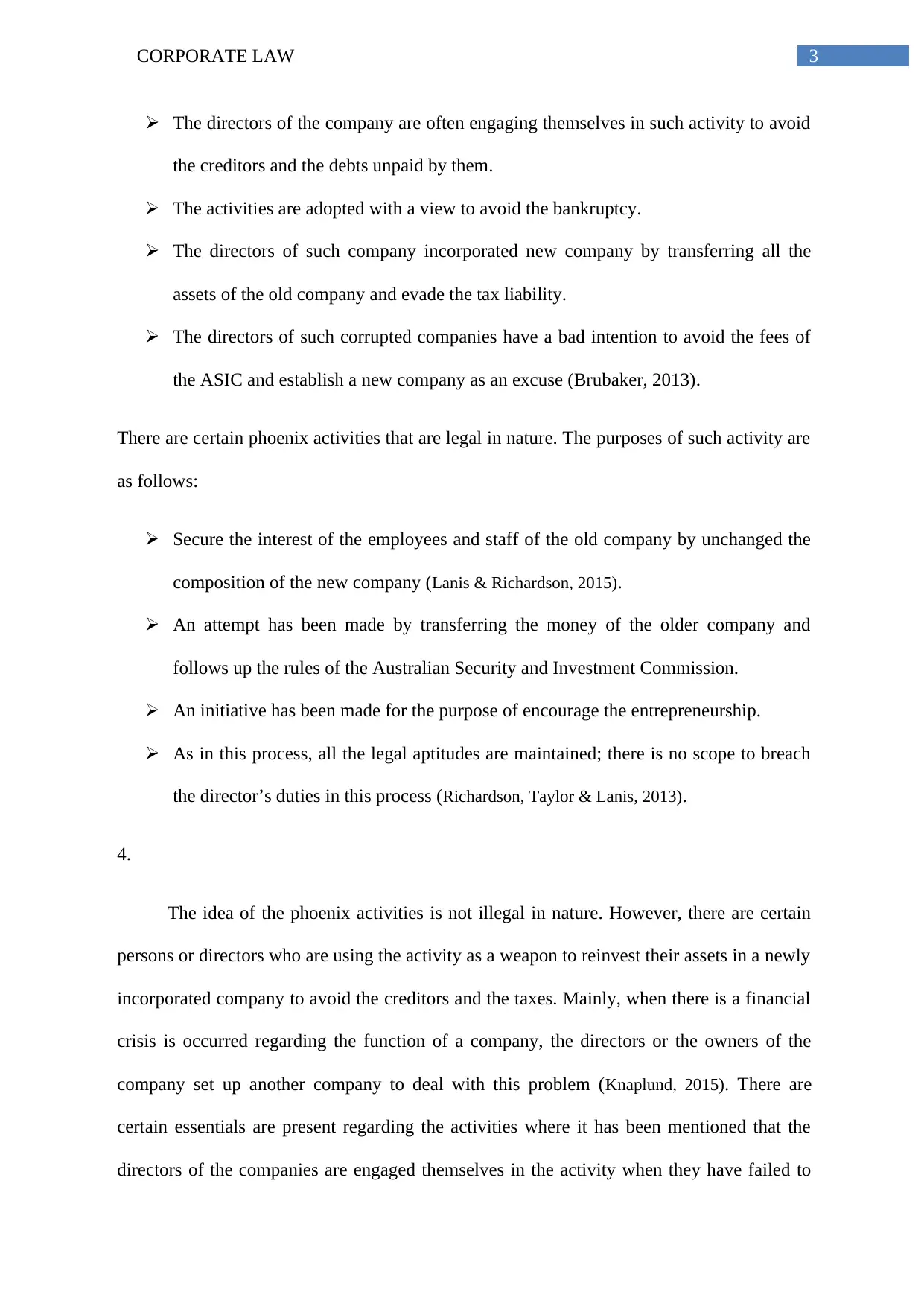
3CORPORATE LAW
The directors of the company are often engaging themselves in such activity to avoid
the creditors and the debts unpaid by them.
The activities are adopted with a view to avoid the bankruptcy.
The directors of such company incorporated new company by transferring all the
assets of the old company and evade the tax liability.
The directors of such corrupted companies have a bad intention to avoid the fees of
the ASIC and establish a new company as an excuse (Brubaker, 2013).
There are certain phoenix activities that are legal in nature. The purposes of such activity are
as follows:
Secure the interest of the employees and staff of the old company by unchanged the
composition of the new company (Lanis & Richardson, 2015).
An attempt has been made by transferring the money of the older company and
follows up the rules of the Australian Security and Investment Commission.
An initiative has been made for the purpose of encourage the entrepreneurship.
As in this process, all the legal aptitudes are maintained; there is no scope to breach
the director’s duties in this process (Richardson, Taylor & Lanis, 2013).
4.
The idea of the phoenix activities is not illegal in nature. However, there are certain
persons or directors who are using the activity as a weapon to reinvest their assets in a newly
incorporated company to avoid the creditors and the taxes. Mainly, when there is a financial
crisis is occurred regarding the function of a company, the directors or the owners of the
company set up another company to deal with this problem (Knaplund, 2015). There are
certain essentials are present regarding the activities where it has been mentioned that the
directors of the companies are engaged themselves in the activity when they have failed to
The directors of the company are often engaging themselves in such activity to avoid
the creditors and the debts unpaid by them.
The activities are adopted with a view to avoid the bankruptcy.
The directors of such company incorporated new company by transferring all the
assets of the old company and evade the tax liability.
The directors of such corrupted companies have a bad intention to avoid the fees of
the ASIC and establish a new company as an excuse (Brubaker, 2013).
There are certain phoenix activities that are legal in nature. The purposes of such activity are
as follows:
Secure the interest of the employees and staff of the old company by unchanged the
composition of the new company (Lanis & Richardson, 2015).
An attempt has been made by transferring the money of the older company and
follows up the rules of the Australian Security and Investment Commission.
An initiative has been made for the purpose of encourage the entrepreneurship.
As in this process, all the legal aptitudes are maintained; there is no scope to breach
the director’s duties in this process (Richardson, Taylor & Lanis, 2013).
4.
The idea of the phoenix activities is not illegal in nature. However, there are certain
persons or directors who are using the activity as a weapon to reinvest their assets in a newly
incorporated company to avoid the creditors and the taxes. Mainly, when there is a financial
crisis is occurred regarding the function of a company, the directors or the owners of the
company set up another company to deal with this problem (Knaplund, 2015). There are
certain essentials are present regarding the activities where it has been mentioned that the
directors of the companies are engaged themselves in the activity when they have failed to
Paraphrase This Document
Need a fresh take? Get an instant paraphrase of this document with our AI Paraphraser
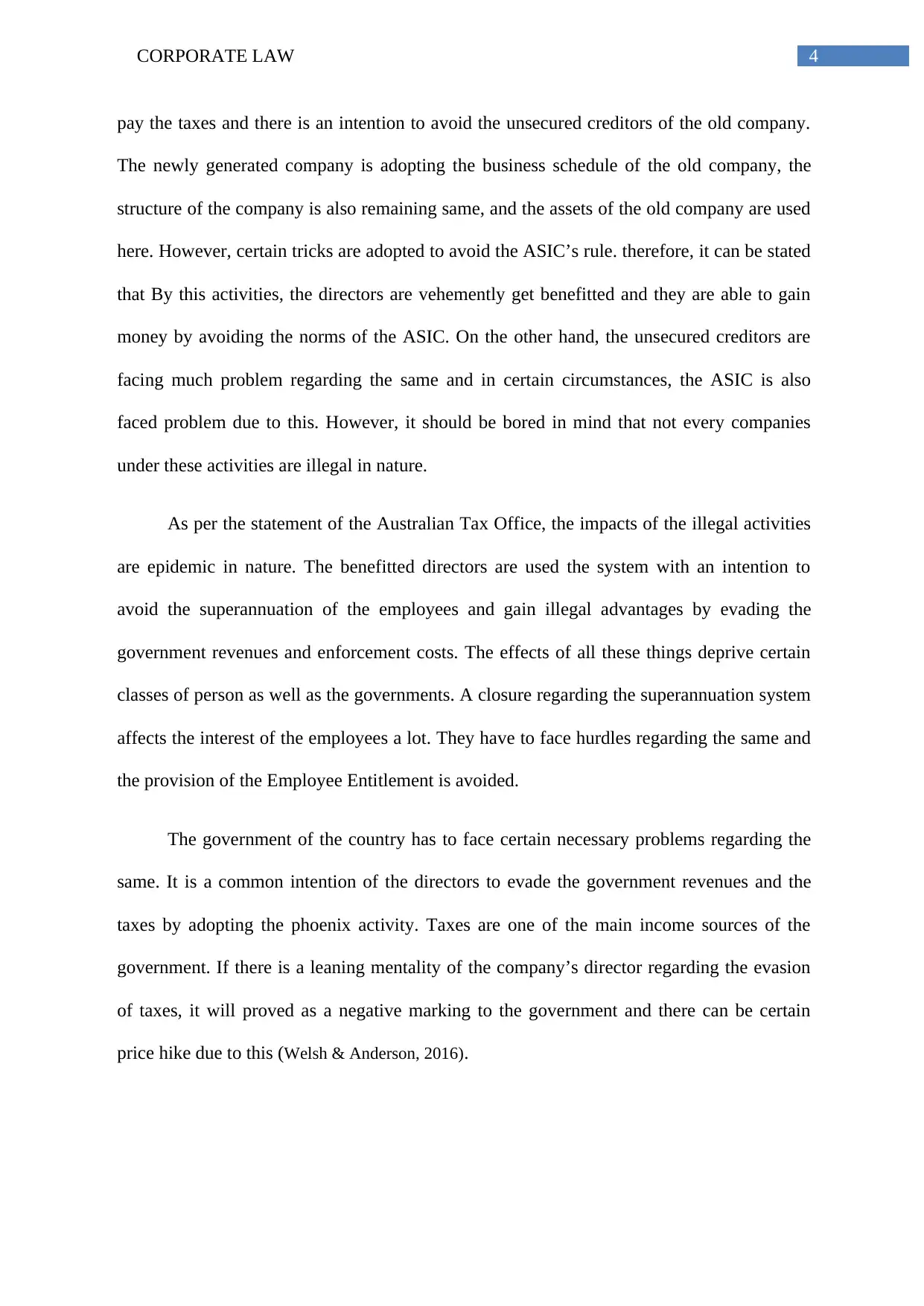
4CORPORATE LAW
pay the taxes and there is an intention to avoid the unsecured creditors of the old company.
The newly generated company is adopting the business schedule of the old company, the
structure of the company is also remaining same, and the assets of the old company are used
here. However, certain tricks are adopted to avoid the ASIC’s rule. therefore, it can be stated
that By this activities, the directors are vehemently get benefitted and they are able to gain
money by avoiding the norms of the ASIC. On the other hand, the unsecured creditors are
facing much problem regarding the same and in certain circumstances, the ASIC is also
faced problem due to this. However, it should be bored in mind that not every companies
under these activities are illegal in nature.
As per the statement of the Australian Tax Office, the impacts of the illegal activities
are epidemic in nature. The benefitted directors are used the system with an intention to
avoid the superannuation of the employees and gain illegal advantages by evading the
government revenues and enforcement costs. The effects of all these things deprive certain
classes of person as well as the governments. A closure regarding the superannuation system
affects the interest of the employees a lot. They have to face hurdles regarding the same and
the provision of the Employee Entitlement is avoided.
The government of the country has to face certain necessary problems regarding the
same. It is a common intention of the directors to evade the government revenues and the
taxes by adopting the phoenix activity. Taxes are one of the main income sources of the
government. If there is a leaning mentality of the company’s director regarding the evasion
of taxes, it will proved as a negative marking to the government and there can be certain
price hike due to this (Welsh & Anderson, 2016).
pay the taxes and there is an intention to avoid the unsecured creditors of the old company.
The newly generated company is adopting the business schedule of the old company, the
structure of the company is also remaining same, and the assets of the old company are used
here. However, certain tricks are adopted to avoid the ASIC’s rule. therefore, it can be stated
that By this activities, the directors are vehemently get benefitted and they are able to gain
money by avoiding the norms of the ASIC. On the other hand, the unsecured creditors are
facing much problem regarding the same and in certain circumstances, the ASIC is also
faced problem due to this. However, it should be bored in mind that not every companies
under these activities are illegal in nature.
As per the statement of the Australian Tax Office, the impacts of the illegal activities
are epidemic in nature. The benefitted directors are used the system with an intention to
avoid the superannuation of the employees and gain illegal advantages by evading the
government revenues and enforcement costs. The effects of all these things deprive certain
classes of person as well as the governments. A closure regarding the superannuation system
affects the interest of the employees a lot. They have to face hurdles regarding the same and
the provision of the Employee Entitlement is avoided.
The government of the country has to face certain necessary problems regarding the
same. It is a common intention of the directors to evade the government revenues and the
taxes by adopting the phoenix activity. Taxes are one of the main income sources of the
government. If there is a leaning mentality of the company’s director regarding the evasion
of taxes, it will proved as a negative marking to the government and there can be certain
price hike due to this (Welsh & Anderson, 2016).
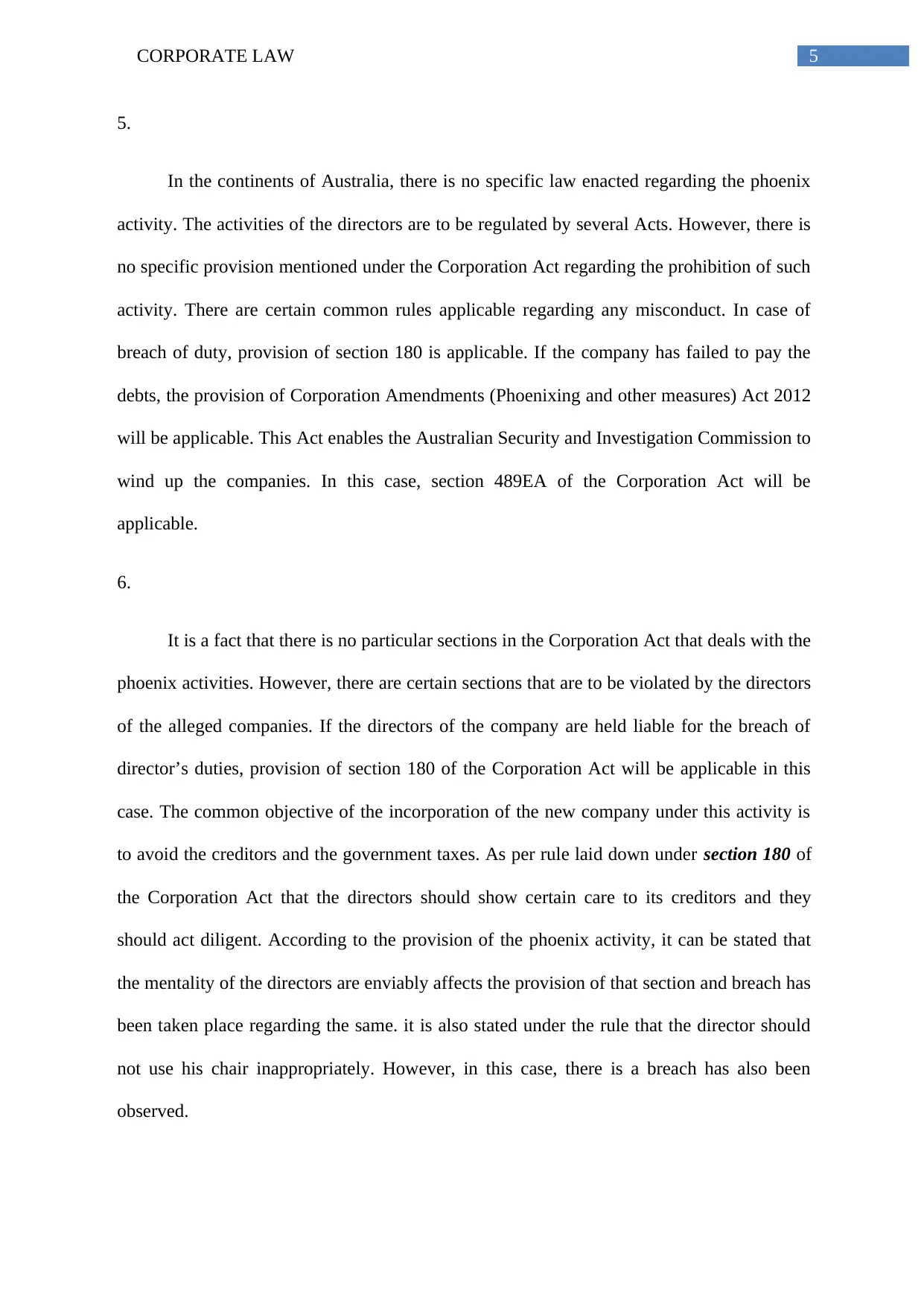
5CORPORATE LAW
5.
In the continents of Australia, there is no specific law enacted regarding the phoenix
activity. The activities of the directors are to be regulated by several Acts. However, there is
no specific provision mentioned under the Corporation Act regarding the prohibition of such
activity. There are certain common rules applicable regarding any misconduct. In case of
breach of duty, provision of section 180 is applicable. If the company has failed to pay the
debts, the provision of Corporation Amendments (Phoenixing and other measures) Act 2012
will be applicable. This Act enables the Australian Security and Investigation Commission to
wind up the companies. In this case, section 489EA of the Corporation Act will be
applicable.
6.
It is a fact that there is no particular sections in the Corporation Act that deals with the
phoenix activities. However, there are certain sections that are to be violated by the directors
of the alleged companies. If the directors of the company are held liable for the breach of
director’s duties, provision of section 180 of the Corporation Act will be applicable in this
case. The common objective of the incorporation of the new company under this activity is
to avoid the creditors and the government taxes. As per rule laid down under section 180 of
the Corporation Act that the directors should show certain care to its creditors and they
should act diligent. According to the provision of the phoenix activity, it can be stated that
the mentality of the directors are enviably affects the provision of that section and breach has
been taken place regarding the same. it is also stated under the rule that the director should
not use his chair inappropriately. However, in this case, there is a breach has also been
observed.
5.
In the continents of Australia, there is no specific law enacted regarding the phoenix
activity. The activities of the directors are to be regulated by several Acts. However, there is
no specific provision mentioned under the Corporation Act regarding the prohibition of such
activity. There are certain common rules applicable regarding any misconduct. In case of
breach of duty, provision of section 180 is applicable. If the company has failed to pay the
debts, the provision of Corporation Amendments (Phoenixing and other measures) Act 2012
will be applicable. This Act enables the Australian Security and Investigation Commission to
wind up the companies. In this case, section 489EA of the Corporation Act will be
applicable.
6.
It is a fact that there is no particular sections in the Corporation Act that deals with the
phoenix activities. However, there are certain sections that are to be violated by the directors
of the alleged companies. If the directors of the company are held liable for the breach of
director’s duties, provision of section 180 of the Corporation Act will be applicable in this
case. The common objective of the incorporation of the new company under this activity is
to avoid the creditors and the government taxes. As per rule laid down under section 180 of
the Corporation Act that the directors should show certain care to its creditors and they
should act diligent. According to the provision of the phoenix activity, it can be stated that
the mentality of the directors are enviably affects the provision of that section and breach has
been taken place regarding the same. it is also stated under the rule that the director should
not use his chair inappropriately. However, in this case, there is a breach has also been
observed.
⊘ This is a preview!⊘
Do you want full access?
Subscribe today to unlock all pages.

Trusted by 1+ million students worldwide
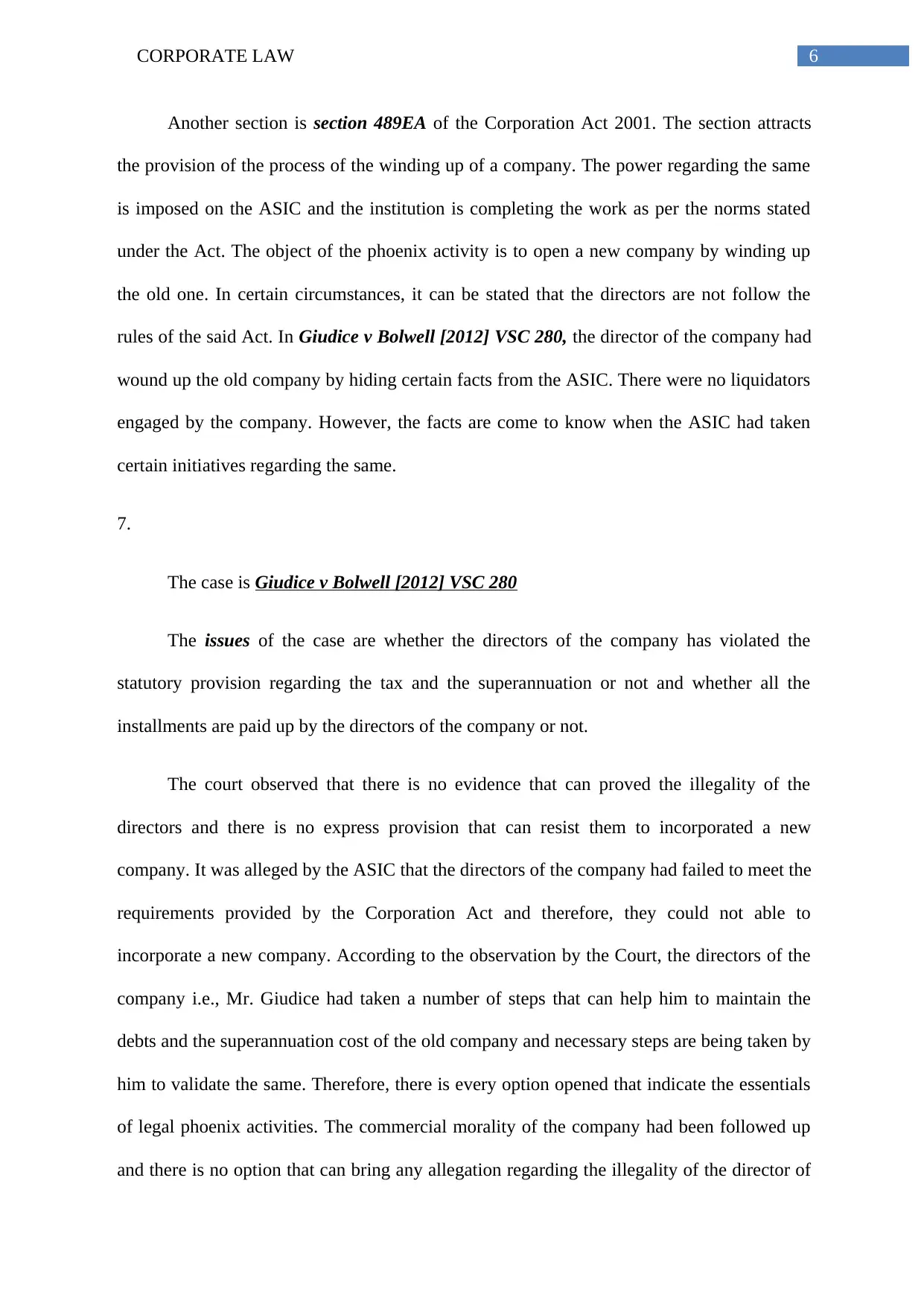
6CORPORATE LAW
Another section is section 489EA of the Corporation Act 2001. The section attracts
the provision of the process of the winding up of a company. The power regarding the same
is imposed on the ASIC and the institution is completing the work as per the norms stated
under the Act. The object of the phoenix activity is to open a new company by winding up
the old one. In certain circumstances, it can be stated that the directors are not follow the
rules of the said Act. In Giudice v Bolwell [2012] VSC 280, the director of the company had
wound up the old company by hiding certain facts from the ASIC. There were no liquidators
engaged by the company. However, the facts are come to know when the ASIC had taken
certain initiatives regarding the same.
7.
The case is Giudice v Bolwell [2012] VSC 280
The issues of the case are whether the directors of the company has violated the
statutory provision regarding the tax and the superannuation or not and whether all the
installments are paid up by the directors of the company or not.
The court observed that there is no evidence that can proved the illegality of the
directors and there is no express provision that can resist them to incorporated a new
company. It was alleged by the ASIC that the directors of the company had failed to meet the
requirements provided by the Corporation Act and therefore, they could not able to
incorporate a new company. According to the observation by the Court, the directors of the
company i.e., Mr. Giudice had taken a number of steps that can help him to maintain the
debts and the superannuation cost of the old company and necessary steps are being taken by
him to validate the same. Therefore, there is every option opened that indicate the essentials
of legal phoenix activities. The commercial morality of the company had been followed up
and there is no option that can bring any allegation regarding the illegality of the director of
Another section is section 489EA of the Corporation Act 2001. The section attracts
the provision of the process of the winding up of a company. The power regarding the same
is imposed on the ASIC and the institution is completing the work as per the norms stated
under the Act. The object of the phoenix activity is to open a new company by winding up
the old one. In certain circumstances, it can be stated that the directors are not follow the
rules of the said Act. In Giudice v Bolwell [2012] VSC 280, the director of the company had
wound up the old company by hiding certain facts from the ASIC. There were no liquidators
engaged by the company. However, the facts are come to know when the ASIC had taken
certain initiatives regarding the same.
7.
The case is Giudice v Bolwell [2012] VSC 280
The issues of the case are whether the directors of the company has violated the
statutory provision regarding the tax and the superannuation or not and whether all the
installments are paid up by the directors of the company or not.
The court observed that there is no evidence that can proved the illegality of the
directors and there is no express provision that can resist them to incorporated a new
company. It was alleged by the ASIC that the directors of the company had failed to meet the
requirements provided by the Corporation Act and therefore, they could not able to
incorporate a new company. According to the observation by the Court, the directors of the
company i.e., Mr. Giudice had taken a number of steps that can help him to maintain the
debts and the superannuation cost of the old company and necessary steps are being taken by
him to validate the same. Therefore, there is every option opened that indicate the essentials
of legal phoenix activities. The commercial morality of the company had been followed up
and there is no option that can bring any allegation regarding the illegality of the director of
Paraphrase This Document
Need a fresh take? Get an instant paraphrase of this document with our AI Paraphraser
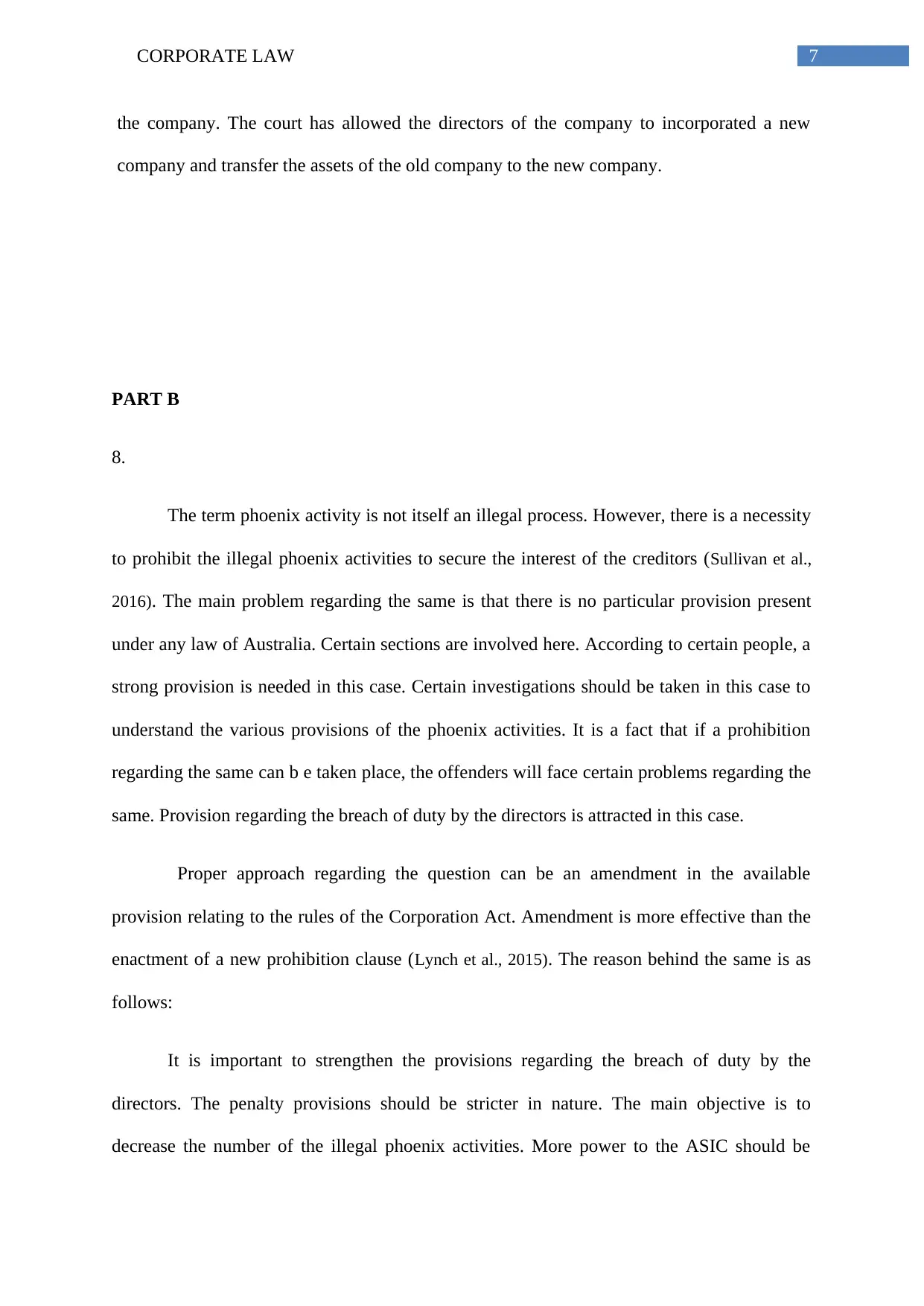
7CORPORATE LAW
the company. The court has allowed the directors of the company to incorporated a new
company and transfer the assets of the old company to the new company.
PART B
8.
The term phoenix activity is not itself an illegal process. However, there is a necessity
to prohibit the illegal phoenix activities to secure the interest of the creditors (Sullivan et al.,
2016). The main problem regarding the same is that there is no particular provision present
under any law of Australia. Certain sections are involved here. According to certain people, a
strong provision is needed in this case. Certain investigations should be taken in this case to
understand the various provisions of the phoenix activities. It is a fact that if a prohibition
regarding the same can b e taken place, the offenders will face certain problems regarding the
same. Provision regarding the breach of duty by the directors is attracted in this case.
Proper approach regarding the question can be an amendment in the available
provision relating to the rules of the Corporation Act. Amendment is more effective than the
enactment of a new prohibition clause (Lynch et al., 2015). The reason behind the same is as
follows:
It is important to strengthen the provisions regarding the breach of duty by the
directors. The penalty provisions should be stricter in nature. The main objective is to
decrease the number of the illegal phoenix activities. More power to the ASIC should be
the company. The court has allowed the directors of the company to incorporated a new
company and transfer the assets of the old company to the new company.
PART B
8.
The term phoenix activity is not itself an illegal process. However, there is a necessity
to prohibit the illegal phoenix activities to secure the interest of the creditors (Sullivan et al.,
2016). The main problem regarding the same is that there is no particular provision present
under any law of Australia. Certain sections are involved here. According to certain people, a
strong provision is needed in this case. Certain investigations should be taken in this case to
understand the various provisions of the phoenix activities. It is a fact that if a prohibition
regarding the same can b e taken place, the offenders will face certain problems regarding the
same. Provision regarding the breach of duty by the directors is attracted in this case.
Proper approach regarding the question can be an amendment in the available
provision relating to the rules of the Corporation Act. Amendment is more effective than the
enactment of a new prohibition clause (Lynch et al., 2015). The reason behind the same is as
follows:
It is important to strengthen the provisions regarding the breach of duty by the
directors. The penalty provisions should be stricter in nature. The main objective is to
decrease the number of the illegal phoenix activities. More power to the ASIC should be
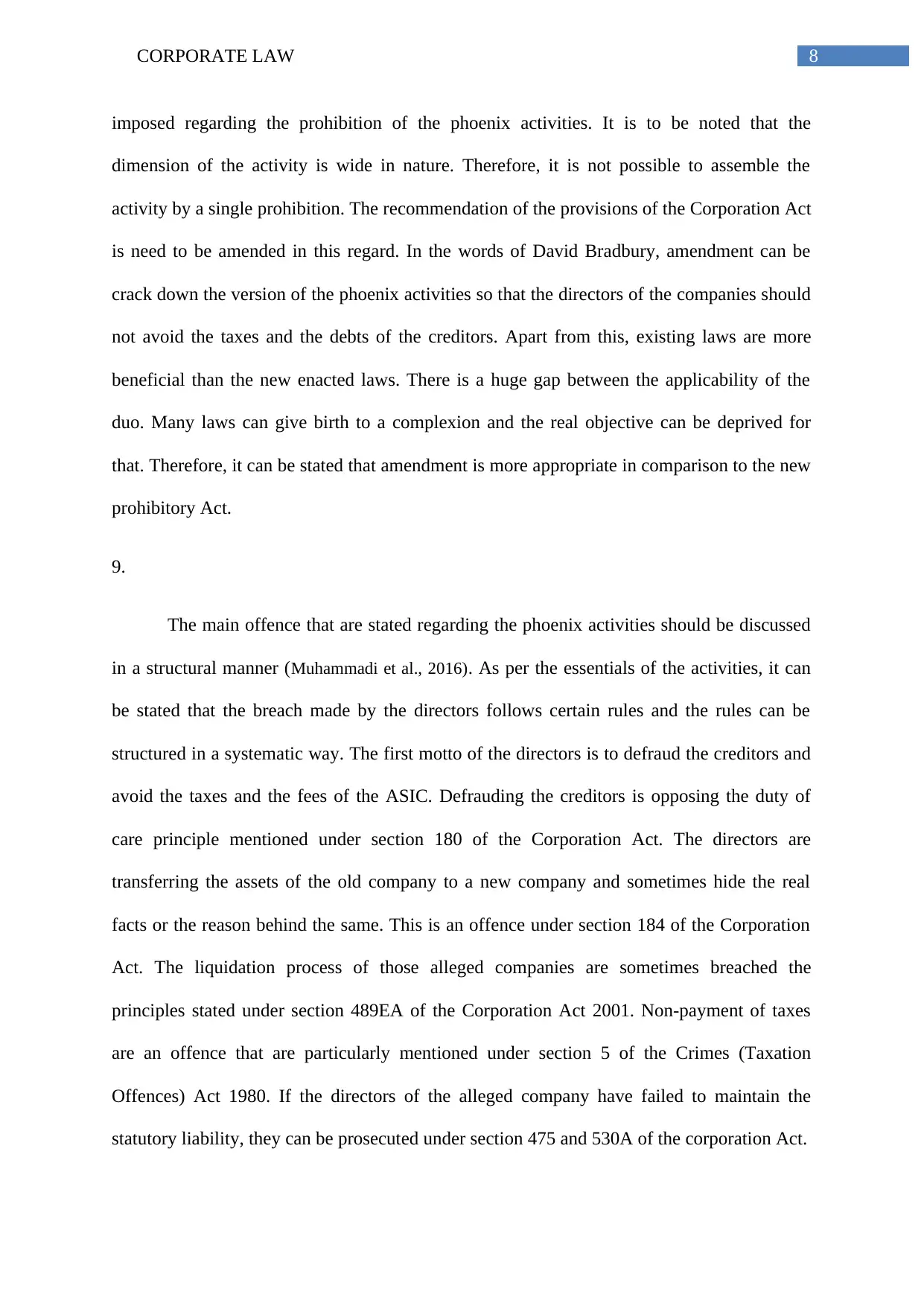
8CORPORATE LAW
imposed regarding the prohibition of the phoenix activities. It is to be noted that the
dimension of the activity is wide in nature. Therefore, it is not possible to assemble the
activity by a single prohibition. The recommendation of the provisions of the Corporation Act
is need to be amended in this regard. In the words of David Bradbury, amendment can be
crack down the version of the phoenix activities so that the directors of the companies should
not avoid the taxes and the debts of the creditors. Apart from this, existing laws are more
beneficial than the new enacted laws. There is a huge gap between the applicability of the
duo. Many laws can give birth to a complexion and the real objective can be deprived for
that. Therefore, it can be stated that amendment is more appropriate in comparison to the new
prohibitory Act.
9.
The main offence that are stated regarding the phoenix activities should be discussed
in a structural manner (Muhammadi et al., 2016). As per the essentials of the activities, it can
be stated that the breach made by the directors follows certain rules and the rules can be
structured in a systematic way. The first motto of the directors is to defraud the creditors and
avoid the taxes and the fees of the ASIC. Defrauding the creditors is opposing the duty of
care principle mentioned under section 180 of the Corporation Act. The directors are
transferring the assets of the old company to a new company and sometimes hide the real
facts or the reason behind the same. This is an offence under section 184 of the Corporation
Act. The liquidation process of those alleged companies are sometimes breached the
principles stated under section 489EA of the Corporation Act 2001. Non-payment of taxes
are an offence that are particularly mentioned under section 5 of the Crimes (Taxation
Offences) Act 1980. If the directors of the alleged company have failed to maintain the
statutory liability, they can be prosecuted under section 475 and 530A of the corporation Act.
imposed regarding the prohibition of the phoenix activities. It is to be noted that the
dimension of the activity is wide in nature. Therefore, it is not possible to assemble the
activity by a single prohibition. The recommendation of the provisions of the Corporation Act
is need to be amended in this regard. In the words of David Bradbury, amendment can be
crack down the version of the phoenix activities so that the directors of the companies should
not avoid the taxes and the debts of the creditors. Apart from this, existing laws are more
beneficial than the new enacted laws. There is a huge gap between the applicability of the
duo. Many laws can give birth to a complexion and the real objective can be deprived for
that. Therefore, it can be stated that amendment is more appropriate in comparison to the new
prohibitory Act.
9.
The main offence that are stated regarding the phoenix activities should be discussed
in a structural manner (Muhammadi et al., 2016). As per the essentials of the activities, it can
be stated that the breach made by the directors follows certain rules and the rules can be
structured in a systematic way. The first motto of the directors is to defraud the creditors and
avoid the taxes and the fees of the ASIC. Defrauding the creditors is opposing the duty of
care principle mentioned under section 180 of the Corporation Act. The directors are
transferring the assets of the old company to a new company and sometimes hide the real
facts or the reason behind the same. This is an offence under section 184 of the Corporation
Act. The liquidation process of those alleged companies are sometimes breached the
principles stated under section 489EA of the Corporation Act 2001. Non-payment of taxes
are an offence that are particularly mentioned under section 5 of the Crimes (Taxation
Offences) Act 1980. If the directors of the alleged company have failed to maintain the
statutory liability, they can be prosecuted under section 475 and 530A of the corporation Act.
⊘ This is a preview!⊘
Do you want full access?
Subscribe today to unlock all pages.

Trusted by 1+ million students worldwide
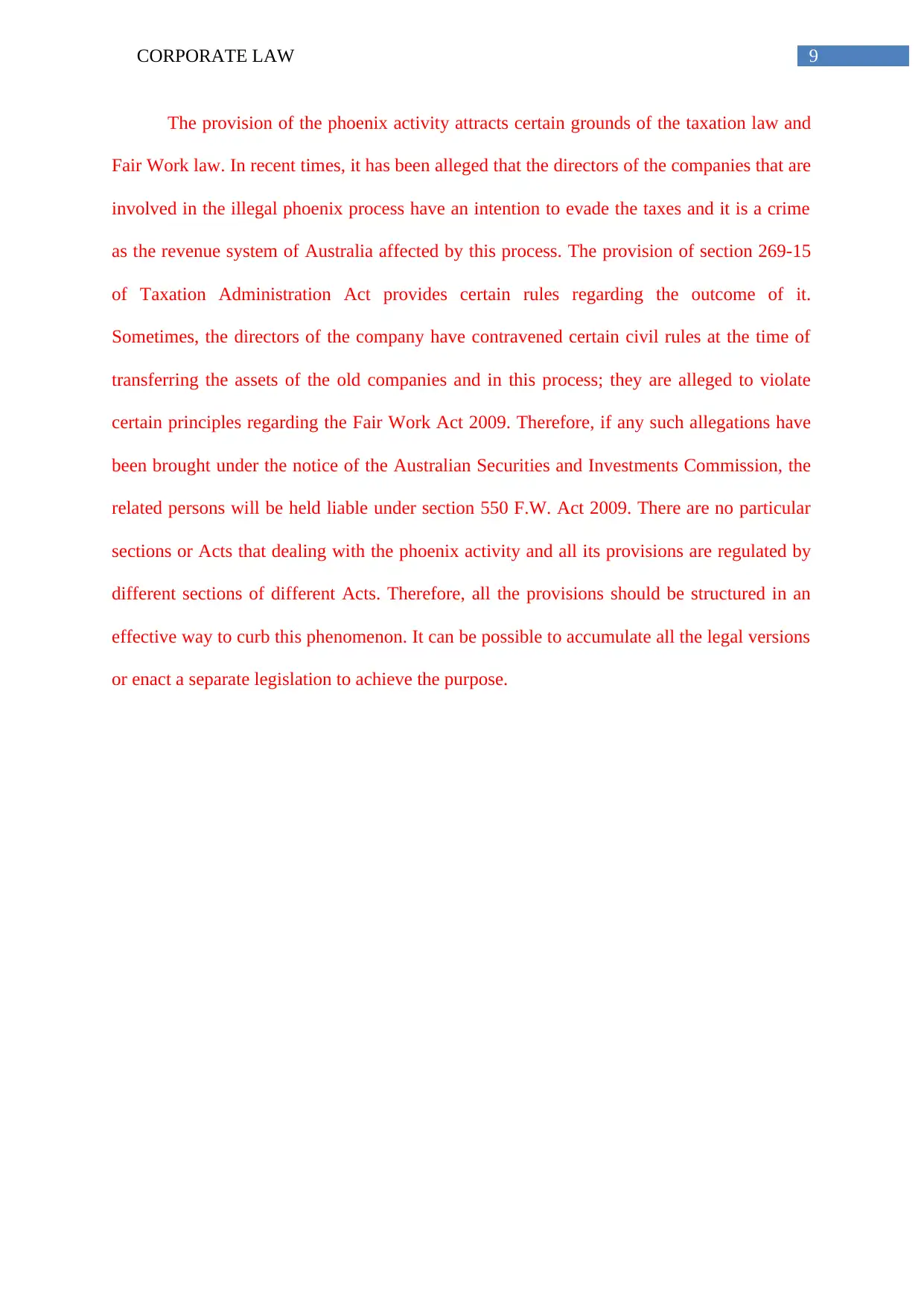
9CORPORATE LAW
The provision of the phoenix activity attracts certain grounds of the taxation law and
Fair Work law. In recent times, it has been alleged that the directors of the companies that are
involved in the illegal phoenix process have an intention to evade the taxes and it is a crime
as the revenue system of Australia affected by this process. The provision of section 269-15
of Taxation Administration Act provides certain rules regarding the outcome of it.
Sometimes, the directors of the company have contravened certain civil rules at the time of
transferring the assets of the old companies and in this process; they are alleged to violate
certain principles regarding the Fair Work Act 2009. Therefore, if any such allegations have
been brought under the notice of the Australian Securities and Investments Commission, the
related persons will be held liable under section 550 F.W. Act 2009. There are no particular
sections or Acts that dealing with the phoenix activity and all its provisions are regulated by
different sections of different Acts. Therefore, all the provisions should be structured in an
effective way to curb this phenomenon. It can be possible to accumulate all the legal versions
or enact a separate legislation to achieve the purpose.
The provision of the phoenix activity attracts certain grounds of the taxation law and
Fair Work law. In recent times, it has been alleged that the directors of the companies that are
involved in the illegal phoenix process have an intention to evade the taxes and it is a crime
as the revenue system of Australia affected by this process. The provision of section 269-15
of Taxation Administration Act provides certain rules regarding the outcome of it.
Sometimes, the directors of the company have contravened certain civil rules at the time of
transferring the assets of the old companies and in this process; they are alleged to violate
certain principles regarding the Fair Work Act 2009. Therefore, if any such allegations have
been brought under the notice of the Australian Securities and Investments Commission, the
related persons will be held liable under section 550 F.W. Act 2009. There are no particular
sections or Acts that dealing with the phoenix activity and all its provisions are regulated by
different sections of different Acts. Therefore, all the provisions should be structured in an
effective way to curb this phenomenon. It can be possible to accumulate all the legal versions
or enact a separate legislation to achieve the purpose.
Paraphrase This Document
Need a fresh take? Get an instant paraphrase of this document with our AI Paraphraser
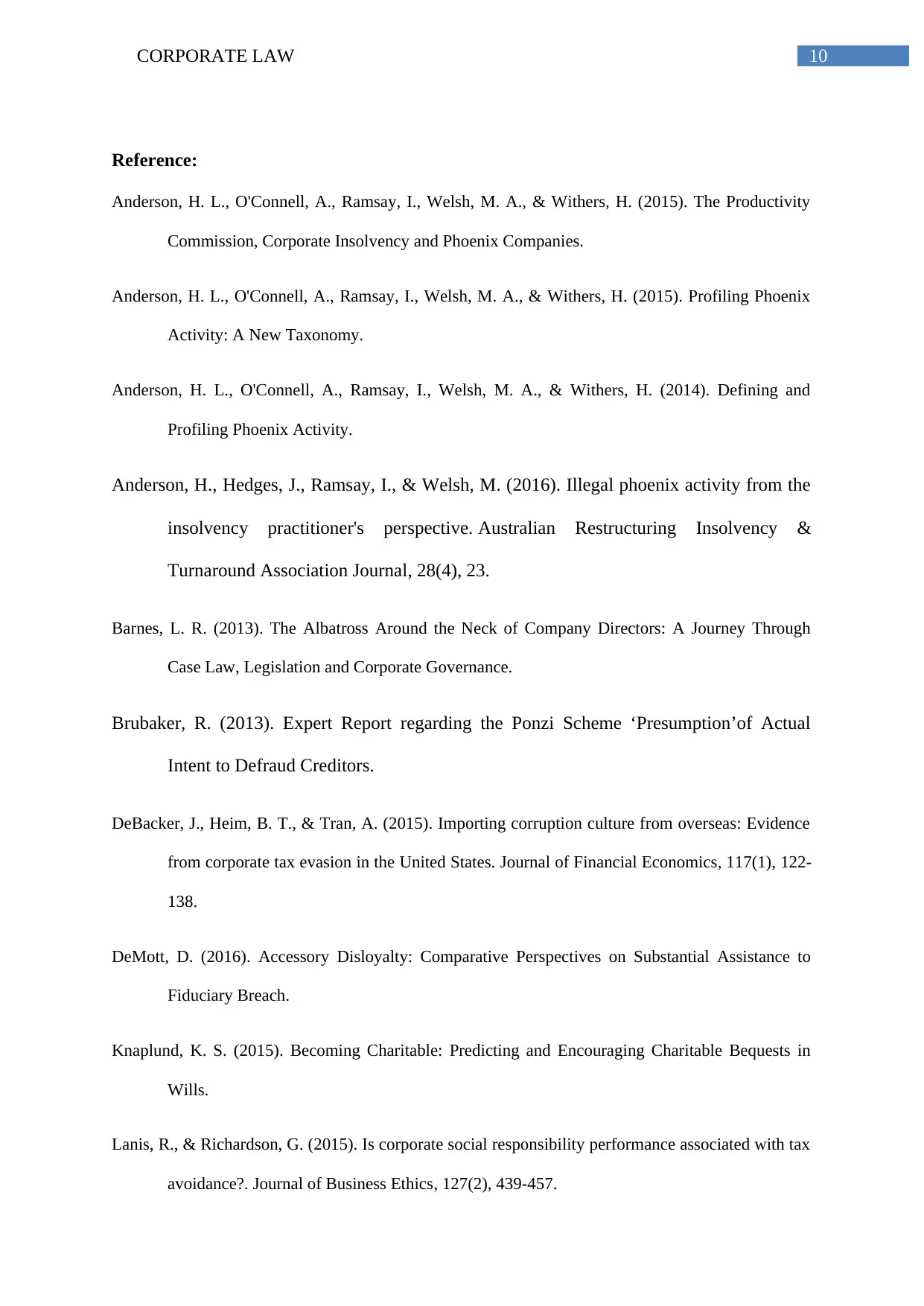
10CORPORATE LAW
Reference:
Anderson, H. L., O'Connell, A., Ramsay, I., Welsh, M. A., & Withers, H. (2015). The Productivity
Commission, Corporate Insolvency and Phoenix Companies.
Anderson, H. L., O'Connell, A., Ramsay, I., Welsh, M. A., & Withers, H. (2015). Profiling Phoenix
Activity: A New Taxonomy.
Anderson, H. L., O'Connell, A., Ramsay, I., Welsh, M. A., & Withers, H. (2014). Defining and
Profiling Phoenix Activity.
Anderson, H., Hedges, J., Ramsay, I., & Welsh, M. (2016). Illegal phoenix activity from the
insolvency practitioner's perspective. Australian Restructuring Insolvency &
Turnaround Association Journal, 28(4), 23.
Barnes, L. R. (2013). The Albatross Around the Neck of Company Directors: A Journey Through
Case Law, Legislation and Corporate Governance.
Brubaker, R. (2013). Expert Report regarding the Ponzi Scheme ‘Presumption’of Actual
Intent to Defraud Creditors.
DeBacker, J., Heim, B. T., & Tran, A. (2015). Importing corruption culture from overseas: Evidence
from corporate tax evasion in the United States. Journal of Financial Economics, 117(1), 122-
138.
DeMott, D. (2016). Accessory Disloyalty: Comparative Perspectives on Substantial Assistance to
Fiduciary Breach.
Knaplund, K. S. (2015). Becoming Charitable: Predicting and Encouraging Charitable Bequests in
Wills.
Lanis, R., & Richardson, G. (2015). Is corporate social responsibility performance associated with tax
avoidance?. Journal of Business Ethics, 127(2), 439-457.
Reference:
Anderson, H. L., O'Connell, A., Ramsay, I., Welsh, M. A., & Withers, H. (2015). The Productivity
Commission, Corporate Insolvency and Phoenix Companies.
Anderson, H. L., O'Connell, A., Ramsay, I., Welsh, M. A., & Withers, H. (2015). Profiling Phoenix
Activity: A New Taxonomy.
Anderson, H. L., O'Connell, A., Ramsay, I., Welsh, M. A., & Withers, H. (2014). Defining and
Profiling Phoenix Activity.
Anderson, H., Hedges, J., Ramsay, I., & Welsh, M. (2016). Illegal phoenix activity from the
insolvency practitioner's perspective. Australian Restructuring Insolvency &
Turnaround Association Journal, 28(4), 23.
Barnes, L. R. (2013). The Albatross Around the Neck of Company Directors: A Journey Through
Case Law, Legislation and Corporate Governance.
Brubaker, R. (2013). Expert Report regarding the Ponzi Scheme ‘Presumption’of Actual
Intent to Defraud Creditors.
DeBacker, J., Heim, B. T., & Tran, A. (2015). Importing corruption culture from overseas: Evidence
from corporate tax evasion in the United States. Journal of Financial Economics, 117(1), 122-
138.
DeMott, D. (2016). Accessory Disloyalty: Comparative Perspectives on Substantial Assistance to
Fiduciary Breach.
Knaplund, K. S. (2015). Becoming Charitable: Predicting and Encouraging Charitable Bequests in
Wills.
Lanis, R., & Richardson, G. (2015). Is corporate social responsibility performance associated with tax
avoidance?. Journal of Business Ethics, 127(2), 439-457.
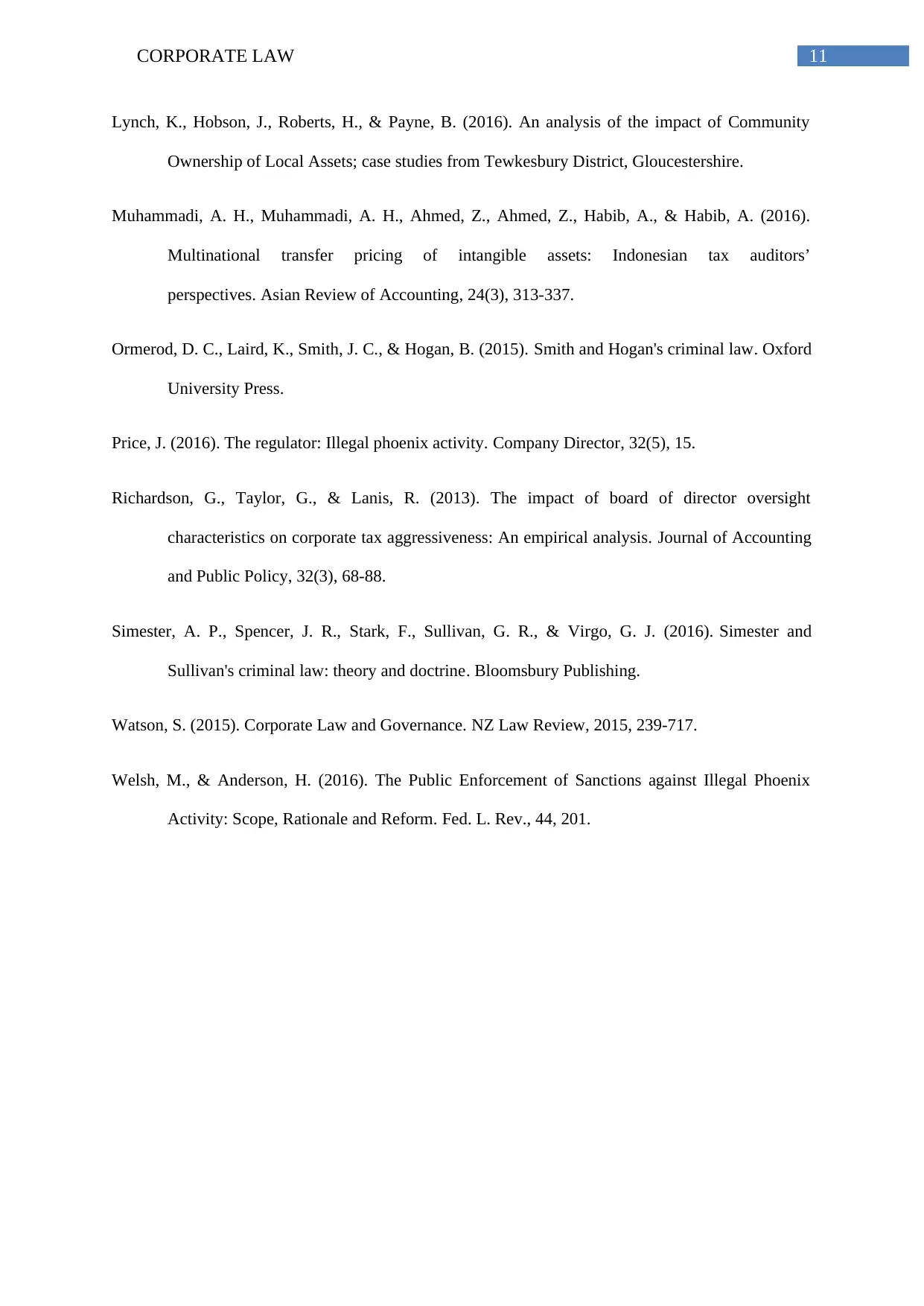
11CORPORATE LAW
Lynch, K., Hobson, J., Roberts, H., & Payne, B. (2016). An analysis of the impact of Community
Ownership of Local Assets; case studies from Tewkesbury District, Gloucestershire.
Muhammadi, A. H., Muhammadi, A. H., Ahmed, Z., Ahmed, Z., Habib, A., & Habib, A. (2016).
Multinational transfer pricing of intangible assets: Indonesian tax auditors’
perspectives. Asian Review of Accounting, 24(3), 313-337.
Ormerod, D. C., Laird, K., Smith, J. C., & Hogan, B. (2015). Smith and Hogan's criminal law. Oxford
University Press.
Price, J. (2016). The regulator: Illegal phoenix activity. Company Director, 32(5), 15.
Richardson, G., Taylor, G., & Lanis, R. (2013). The impact of board of director oversight
characteristics on corporate tax aggressiveness: An empirical analysis. Journal of Accounting
and Public Policy, 32(3), 68-88.
Simester, A. P., Spencer, J. R., Stark, F., Sullivan, G. R., & Virgo, G. J. (2016). Simester and
Sullivan's criminal law: theory and doctrine. Bloomsbury Publishing.
Watson, S. (2015). Corporate Law and Governance. NZ Law Review, 2015, 239-717.
Welsh, M., & Anderson, H. (2016). The Public Enforcement of Sanctions against Illegal Phoenix
Activity: Scope, Rationale and Reform. Fed. L. Rev., 44, 201.
Lynch, K., Hobson, J., Roberts, H., & Payne, B. (2016). An analysis of the impact of Community
Ownership of Local Assets; case studies from Tewkesbury District, Gloucestershire.
Muhammadi, A. H., Muhammadi, A. H., Ahmed, Z., Ahmed, Z., Habib, A., & Habib, A. (2016).
Multinational transfer pricing of intangible assets: Indonesian tax auditors’
perspectives. Asian Review of Accounting, 24(3), 313-337.
Ormerod, D. C., Laird, K., Smith, J. C., & Hogan, B. (2015). Smith and Hogan's criminal law. Oxford
University Press.
Price, J. (2016). The regulator: Illegal phoenix activity. Company Director, 32(5), 15.
Richardson, G., Taylor, G., & Lanis, R. (2013). The impact of board of director oversight
characteristics on corporate tax aggressiveness: An empirical analysis. Journal of Accounting
and Public Policy, 32(3), 68-88.
Simester, A. P., Spencer, J. R., Stark, F., Sullivan, G. R., & Virgo, G. J. (2016). Simester and
Sullivan's criminal law: theory and doctrine. Bloomsbury Publishing.
Watson, S. (2015). Corporate Law and Governance. NZ Law Review, 2015, 239-717.
Welsh, M., & Anderson, H. (2016). The Public Enforcement of Sanctions against Illegal Phoenix
Activity: Scope, Rationale and Reform. Fed. L. Rev., 44, 201.
⊘ This is a preview!⊘
Do you want full access?
Subscribe today to unlock all pages.

Trusted by 1+ million students worldwide
1 out of 12
Related Documents
Your All-in-One AI-Powered Toolkit for Academic Success.
+13062052269
info@desklib.com
Available 24*7 on WhatsApp / Email
![[object Object]](/_next/static/media/star-bottom.7253800d.svg)
Unlock your academic potential
Copyright © 2020–2026 A2Z Services. All Rights Reserved. Developed and managed by ZUCOL.





